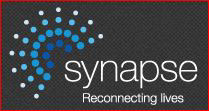Not all people with hidden disabilities require assistance. But if you do, wearing the Hidden Disabilities Sunflower Lanyard discreetly indicates that you need additional support or just a little more time. Our Hidden Disabilities Sunflower Lanyard has become the established symbol for hidden disabilities in the UK and has been successfully introduced to several major UK airports, supermarkets, railway stations and sports venues. The scheme has also been endorsed by a number of hidden disability charities including the RNIB, Alzheimer’s Society, The National Autistic Society and Action on Hearing Loss.

The Synapse website is full of useful advice and help with Autism, Aspergers, and other related disorders.
. Explain at every stage what you are about to do, what will happen next and why.
. Give the person enough time to understand the information you are sharing and wait a few seconds for a response if it is not given immediately.
. Questions should be clear and direct, using language that is easy to understand using pictures where necessary. DO NOT rely on the person to pick up on the meaning of your questions or body language.
. People with autism might take what you say literally so avoid words with a double meaning or humour that could be misunderstood.
. Maintain a routine, familiarity is often important to some people with autism.
. Social difficulties may include a lack of eye contact and unusual body language, talking at inapropriate moments or about innapropriate topics.
. Repetative behaviours might be a coping mechanism and therefore should be respected.
. The environment is important, some people with autism are particularly sensitive to light, movement, sound, smell and touch. Try to keep the immediate environment as calm as possible to help alleviate the anxiety.
. Always consider the persons behaviour in terms of his or her autism, even if it becomes challenging.
. Ask the person and/or parent, carer or advocate what support they might need.
Credit to TEDx Talks / Carrie Beckwith-Fellows
Credit to: Lee Health
Credit to: SeattleChildrens
Credit to: BetterHelp
Credit to: TEDx Talks / Dylan Dailor
Credit to: Cleveland Clinic
Credit to: Phoenix Children's Hospital